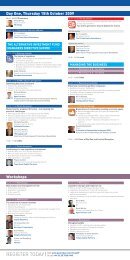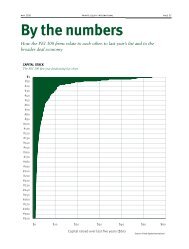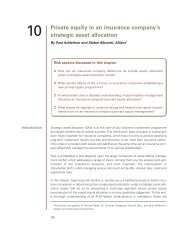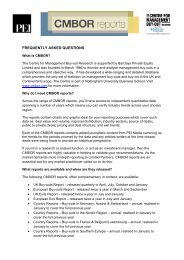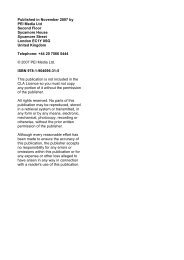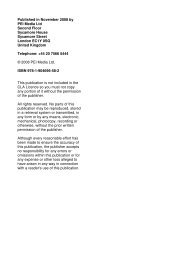THE ANNUAL REVIEW 2010 - PEI Media
THE ANNUAL REVIEW 2010 - PEI Media
THE ANNUAL REVIEW 2010 - PEI Media
Create successful ePaper yourself
Turn your PDF publications into a flip-book with our unique Google optimized e-Paper software.
page 96 private equity annual review <strong>2010</strong><br />
c a r r y ta x<br />
Carrying on<br />
For decades the US has grappled with how tax authorities should treat carried interest<br />
Private equity’s growth into a multibillion<br />
dollar industry has made it a natural tax<br />
target for a government struggling to plug<br />
deficit holes.<br />
Politicians have in recent years argued<br />
over whether carry should be treated as<br />
compensation for services (federally taxed<br />
as ordinary income at a rate as high as 35<br />
percent) or whether it represents a quasiinvestment<br />
return for fund managers, to<br />
be treated under the more tax friendly<br />
long-term capital gains rate of 15<br />
percent. During such debate in 2009, the<br />
government estimated that more than $25<br />
billion in tax revenue would be created by<br />
reclassifying carried interest’s tax status.<br />
Republicans – who reclaimed power in<br />
the lower house of Congress in 2011—<br />
have been able to thus far block repeated<br />
attempts to raise and reclassify the current<br />
capital gains tax treatment of carried<br />
interest.<br />
Proposals under the Democratic<br />
leadership’s most recently blocked legislative<br />
efforts would have prevented GPs from<br />
paying taxes entirely at the capital gains rate<br />
on carried interest, and under certain rules,<br />
would have treated up to 75 percent of carry<br />
as ordinary income beginning this year. For<br />
assets and partnership interests held for at<br />
least five years, the ratio would change to<br />
a 50/50 split.<br />
Not one to back down from a fight,<br />
President Obama has continued the debate<br />
into 2011 by including tax hikes in carried<br />
interest as part of his 2012 budget proposal.<br />
He will be sure to find staunch opposition<br />
from the new Republican-led House of<br />
Representatives. ■<br />
An overview of government’s long standing debate over how tax authorities should treat carried interest<br />
1974: US Court of Appeals rules that future carried interest<br />
is a taxable event.<br />
1991: A similar case heard by the Court of Appeals reverses<br />
earlier decisions, saying a right to future fund profits is not<br />
in fact a taxable event.<br />
1993: US Treasury Department and IRS adopt rules<br />
formalising the 1991 court decision.<br />
2005: Treasury revisits the issue, reconfirming the 1993<br />
guidelines, but proposes greater regulation on how the<br />
award of future carried interest should be valued.<br />
June 2007: Democratic congressman Sander Levin<br />
introduces bill HR 2834, which proposed treating<br />
carried interest as ordinary income instead of the lower<br />
rates provided by capital gains. The bill eventually died<br />
in committee. Similar efforts in the Senate also fail to<br />
materialise.<br />
July 2007: Senate Finance Committee investigates the<br />
issue of carried interest. The department of Treasury testifies<br />
on behalf of a capital gains tax treatment. No new immediate<br />
bills addressing carry are introduced in either chamber of<br />
Congress.<br />
February 2009: President Obama submits his <strong>2010</strong> budget<br />
proposal which called for treating carried interest under<br />
ordinary income tax rates.<br />
May <strong>2010</strong>: House of Representatives votes to approve<br />
the “American Jobs and Closing Tax Loopholes Act” which<br />
would ultimately treat 75 percent of carry as ordinary<br />
income, with the remaining 25 percent under the more<br />
tax friendly capital gains rates.<br />
June <strong>2010</strong>: Senate Republicans defeat the act in a 52 to<br />
45 vote.<br />
September, <strong>2010</strong>: Democratic chairman of the Senate<br />
Finance Committee Max Baucus introduces the “Job<br />
Creation and Tax Cuts Act”, which reintroduces carried<br />
interest provisions pulled from the defeated June bill.<br />
October <strong>2010</strong>: US lawmakers go on recess without passing<br />
the tax reform package introduced by Baucus one month<br />
prior.<br />
November <strong>2010</strong>: Republicans retake control of the US<br />
House of Representatives, potentially setting back recent<br />
carry tax reform efforts.<br />
January 2011: Assuming no action on the matter by<br />
Congress, tax cuts enacted almost a decade ago expire<br />
– raising tax rates on ordinary income and capital gains.<br />
February 2011: US President Barack Obama included in his<br />
proposed budget that Congress require GPs to pay ordinary<br />
tax rates on the profits they receive as compensation instead<br />
of capital gains.



